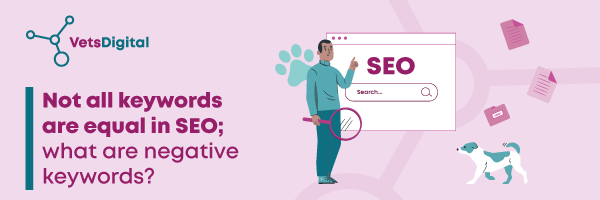News, Paid Search, PPC ads,
Not all keywords are equal in SEO; what are negative keywords?
Pay-per-click (PPC) (sometimes called Paid Search) advertising can be a powerful component of a robust digital marketing strategy for your veterinary practice especially if you’re hoping to reach new pet owners in your community, however solid results can only be generated with an equally strong keyword strategy.
Why?
Because not all keywords are equal. While some keywords will help you to drive more clicks to your website and conversions, others simply won’t.
There will also be many words and phrases that you just don’t want to show up for in search engine results pages (SERPs), either because they aren’t relevant to the services you’re offering or they are simply too competitive to drive meaningful outcomes.
This is where negative keywords come into play. Negative keywords are words and/or phrases that you can incorporate into your practice’s PPC campaigns to ensure that your ads aren’t appearing within irrelevant SERPs, online video content, or websites.
(learn more about PPC advertising here: How can Google Ads & Paid Search help to grow my veterinary practice? – VetsDigital)

What can negative keyword targeting help me to achieve?
There are numerous advantages to adopting a negative keywords targeting strategy.
-
Increase your conversion rate
By ensuring that your ads aren’t appearing in irrelevant SERPs, your advertising budget will be spent on well-placed ads that will connect with your ideal audience of pet owners and generate more conversions.
-
Minimise your ad spend
Investment in advertising is only money well spent if it generates meaningful results for your practice. Utilising negative keywords will minimise spending on clicks made by people who aren’t interested in what you have to offer.
-
Maintain your practice’s brand image
Negative keywords can help you to avoid your brand being associated with topics or terms that just don’t align with your image or your values. So, if your veterinary practice specialises in advanced fields such as orthopaedics or cardiology, you could use negative keywords to ensure that your practice stands apart from other practices who offer general practice services.
-
Boost your Google Quality Score
Google uses Quality Score to evaluate the quality of an advert. Ensuring that you maintain a high Quality Score is important because this metric plays a role in determining whether your ad will be shown and where it appears. Negative keywords can help you boost the relevancy of your ads, which is one of the three primary elements that can positively impact your Quality Score.
What is a negative keyword match type?
If you’ve tried building your own PPC campaigns, and you’ve explored negative keywords before, even very briefly, then you may have encountered negative keyword match types. Essentially, every time you add a negative keyword to one of your ad campaigns, you will need to select a keyword match type which will help to determine that the right queries are excluded.
Let’s take a look at the different types.
-
Broad match negative keywords
Within Google Ads, this is the default option. With broad match selected, your ad won’t be served within search queries using your negative keywords regardless of the order they appear.
So, if you’re using “exotic pets vet” as a negative keyword, your ad won’t show if someone searches for “vet exotic pets” because that search contains all your negative terms. However, if someone were to search for “vet exotic pet”, your ad may be shown because you have specified the plural version of pets as your negative keyword.
-
Phrase match negative keywords
With phrase match selected, your ad won’t be shown in SERPs for queries that include your negative keyword terms in a very specific order.
So, using the same example as above, your ad won’t appear in SERPs for “exotic pets vet near me”. However, your ad may be shown in SERPs for queries like “exotic animal vets” or “vets exotic animals”.
-
Exact match negative keywords
As the name suggests, your ad won’t be shown in SERPs for queries that precisely match your negative keyword terms. Again, using the same example as before, your ads won’t appear for queries for the term “exotic pets vet”. However, your ad may appear for variations on that query, such as “vets for exotic pets” because this uses the plural of vet.
As you can see, attention to detail is required when putting together fully optimised Google and Bing PPC advertising campaigns that drive positive results and tangible outcomes for your practice.
How to identify negative keywords
As we’ve explored, using negative keywords is an excellent way to optimise your veterinary practice’s PPC ad campaigns, but it’s important to identify the right negative keywords in the first place. Here are some tips to keep in mind.
-
Keyword research
Keyword research will help you to understand which keywords and phrases pet owners are searching for to find results in your community, but it can also be a powerful tool for identifying keywords that aren’t relevant to your campaign.
In addition to making a list of keywords you want to target, make a second list featuring keywords you want to exclude.
-
Look at the “Search terms” report in your Google Ads account
This report will show you all the search queries that real people have used where your ad has been triggered. We recommend reviewing this frequently as it will highlight any keywords irrelevant to your PPC campaign and which aren’t generating positive outcomes.
-
Understand what your competitors are doing
While every brand is different, keeping an eye on your competitor’s advertising efforts can provide a wealth of inspiration for your own practice’s advertising strategy.
For more advice on running your own PPC campaigns to aid your new client acquisition or to target your ideal pet owner, get in touch with us today!






